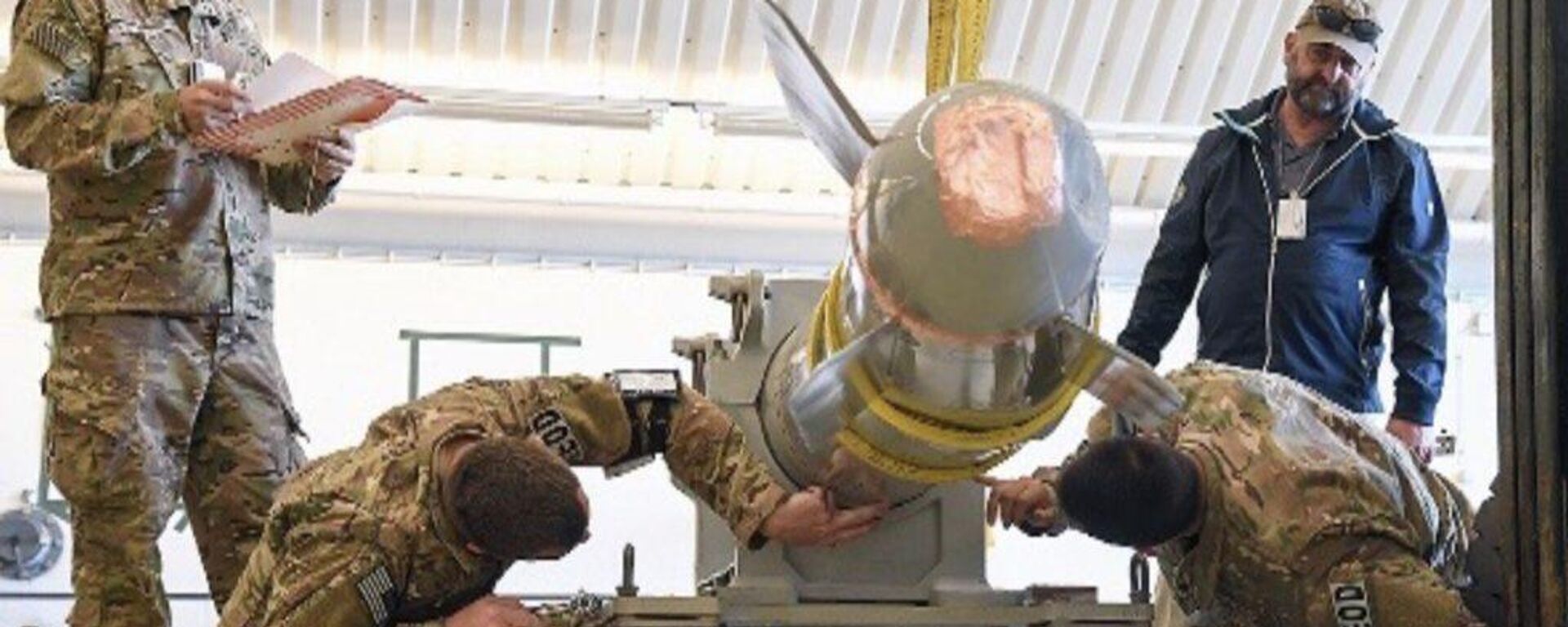https://sputnikglobe.com/20240125/pentagon-faces-16-billion-tab-for-middle-east-military-surge-amid-budget-standoff-1116378403.html
Pentagon Faces $1.6 Billion Tab for Middle East Military Surge Amid Budget Standoff
Pentagon Faces $1.6 Billion Tab for Middle East Military Surge Amid Budget Standoff
Sputnik International
The Pentagon is grappling with a hefty bill of $1.6 billion for the military buildup in the Middle East following the October 7 attacks by Hamas on Israel.
2024-01-25T14:13+0000
2024-01-25T14:13+0000
2024-01-25T14:13+0000
jack reed
patty murray
ukraine
east
israel
defense department
pentagon
senate
taiwan
us senators
https://cdn1.img.sputnikglobe.com/img/07e8/01/13/1116263544_0:0:3312:1864_1920x0_80_0_0_3d70f2e087e348165e02398b60bacf15.jpg
The estimate, sent by the Defense Department to congressional appropriators, includes the deployment of additional warships, fighter jets, and equipment to the region, sustained for the past four months.This financial burden has arisen due to the inability of lawmakers to pass a budget, leaving the Pentagon with insufficient funds to cover the unplanned operations. The escalating costs, likely to reach $2.2 billion over a full year, come at a critical juncture as negotiations over President Joe Biden's $100 billion-plus supplemental request for Israel, Ukraine, and Taiwan reach a pivotal point in the Senate.Since the October 7 attack on Israel, the Pentagon has increased its presence in the Middle East, deploying an additional aircraft carrier strike group, Marine-carrying amphibious ships, fighter jets, air defenses, and hundreds of troops. Initially intended to deter further escalation, these forces have more recently been safeguarding civilian ships in the Red Sea from Houthi attacks.However, the absence of an agreed-upon full-year spending bill for the Defense Department has left the military without the necessary funds for these operations. Lawmakers are now considering options such as incorporating the costs into the annual spending bill, adding them to the emergency supplemental for Ukraine and Israel, or creating a stand-alone supplemental for war costs.Acknowledging the financial challenge, one official remarked: While negotiations are ongoing, there is uncertainty about whether the Middle East funding should be included in the supplemental. Senate Appropriations Chair Patty Murray emphasized the need to evaluate the entire picture before making a decision. Senate Armed Services Chair Jack Reed suggested that, given the unexpected costs, a separate supplemental might be necessary.As Congress navigates these discussions, the urgency of funding is becoming evident, with some senators arguing that the military cannot wait much longer.The costs associated with the unplanned Middle East operations, spanning the 120-day period from October to January, break down into military personnel costs, operations and maintenance, procurement, research and development, and transportation.The Pentagon's projection for maintaining these operations for a full year places the total price tag at $2.2 billion. The need for a resolution is increasingly pressing as the Pentagon is facing a growing financial gap in the wake of unforeseen military commitments in the Middle East.
https://sputnikglobe.com/20240122/us-budget-tussle-means-risk-of-avoiding-govt-shutdown-only-temporary---fitch-1116321458.html
https://sputnikglobe.com/20240120/us-lawmakers-blame-biden-for-failing-to-modernize-us-nuclear-arsenal-1116282232.html
ukraine
east
israel
taiwan
americas
Sputnik International
feedback@sputniknews.com
+74956456601
MIA „Rossiya Segodnya“
2024
Sputnik International
feedback@sputniknews.com
+74956456601
MIA „Rossiya Segodnya“
News
en_EN
Sputnik International
feedback@sputniknews.com
+74956456601
MIA „Rossiya Segodnya“
Sputnik International
feedback@sputniknews.com
+74956456601
MIA „Rossiya Segodnya“
us senate middle east, us senate middle east budget, us senate ukraine taiwan issue budget, us senate defense budget, us senate budget committee, us senate pentagon budget, pentagon budget audit, pentagon budget deficit
us senate middle east, us senate middle east budget, us senate ukraine taiwan issue budget, us senate defense budget, us senate budget committee, us senate pentagon budget, pentagon budget audit, pentagon budget deficit
Pentagon Faces $1.6 Billion Tab for Middle East Military Surge Amid Budget Standoff
The Pentagon is grappling with a hefty bill of $1.6 billion for the military buildup in the Middle East following the October 7 attacks by Hamas on Israel.
The estimate, sent by the Defense Department to congressional appropriators, includes the deployment of additional warships, fighter jets, and equipment to the region, sustained for the past four months.
This financial burden has arisen due to the inability of lawmakers to pass a budget, leaving the Pentagon with insufficient funds to cover the unplanned operations. The
escalating costs, likely to reach $2.2 billion over a full year, come at a critical juncture as negotiations over President Joe Biden's $100 billion-plus
supplemental request for Israel,
Ukraine, and Taiwan reach a pivotal point in the Senate.
Since the October 7 attack on Israel, the Pentagon has increased
its presence in the Middle East, deploying an additional aircraft carrier strike group, Marine-carrying amphibious ships, fighter jets, air defenses, and hundreds of troops. Initially intended to
deter further escalation, these forces have more recently been safeguarding civilian ships in the Red Sea from
Houthi attacks.

22 January 2024, 22:36 GMT
However, the absence of an agreed-upon full-year spending bill for the Defense Department has left the military
without the necessary funds for these operations. Lawmakers are now considering options such as incorporating the costs into the annual spending bill, adding them to the emergency supplemental for Ukraine and Israel, or creating a stand-alone supplemental for war costs.
Acknowledging the financial challenge, one official remarked:
"It is a bill that will be due, and we will have to pay for it within a limited amount of resources."
While negotiations are ongoing, there is
uncertainty about whether the Middle East funding should be included in the supplemental. Senate Appropriations Chair Patty Murray emphasized the need to evaluate the entire picture before making a decision. Senate Armed Services Chair Jack Reed suggested that, given the unexpected costs, a separate supplemental might be necessary.
As Congress navigates these discussions, the urgency of funding is becoming evident, with some senators arguing that the military cannot wait much longer.
“They need it sooner. They’re fast running out of funds,” Sen. Susan Collins, the top ranking Republican on the Senate Appropriations Committee, said.
The costs associated with the unplanned Middle East operations, spanning the 120-day period from October to January, break down into military personnel costs, operations and maintenance, procurement, research and development, and transportation.

20 January 2024, 02:53 GMT
The Pentagon's
projection for maintaining these operations for a full year places the total price tag at $2.2 billion. The need for a resolution is increasingly pressing as the Pentagon is facing a growing financial gap in the wake of unforeseen military commitments in the Middle East.




